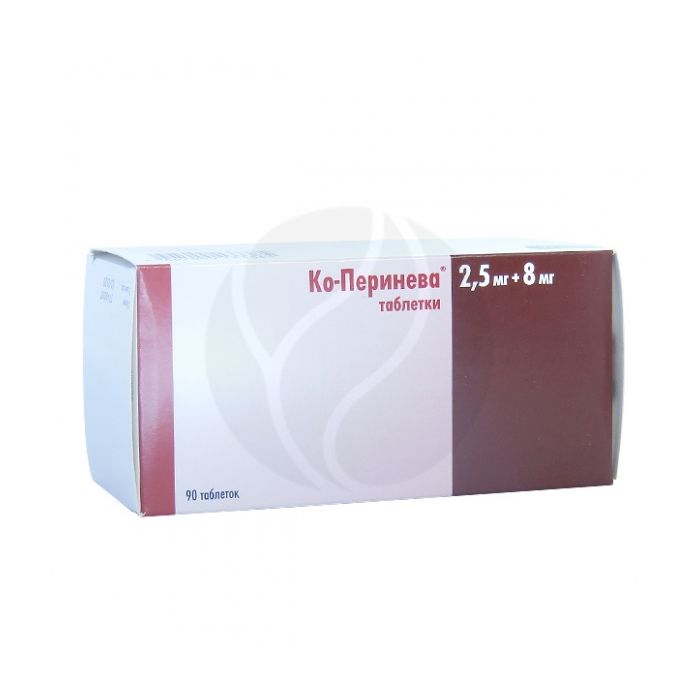Co-perineva tablets 8 + 2.5mg, no. 90
Expiration Date: 05/2027
Russian Pharmacy name:
Ко-перинева таблетки 8+2,5мг, №90
Essential hypertension.
Inside, 1 time per day, preferably in the morning before breakfast, drinking plenty of fluids.
If possible, taking the drug should start with the selection of doses of single-component drugs. In case of clinical need, it is possible to prescribe a combination therapy with Co-PerinevaЃ immediately after monotherapy.
Doses are given for the indapamide / perindopril ratio.
The initial dose is 1 table. Co-PerinevaЃ (0.625 mg / 2 mg) once a day. If, after 1 month of taking the drug, it is not possible to achieve adequate control of blood pressure, the dose of the drug should be increased to 1 table. Co-PerinevaЃ (1.25 mg / 4 mg) once a day.
If necessary, to achieve a more pronounced hypotensive effect, it is possible to increase the dose of the drug to the maximum daily dose of the drug Co-PerinevaЃ - 1 table. (2.5 mg / 8 mg) once a day.
Elderly patients. The initial dose is 1 table. the drug Co-Perineva 0.625 mg / 2 mg once a day. Treatment with the drug should be prescribed after monitoring renal function and blood pressure.
Patients with impaired renal function. The drug Co-PerinevaЃ is contraindicated for patients with severe renal insufficiency (Cl creatinine less than 30 ml / min) (see 'Contraindications').
Patients with moderately severe renal insufficiency (Cl creatinine 30-60 ml / min) are recommended to start therapy with the necessary doses of drugs (in monotherapy) that are part of the drug Co-PerinevaЃ; the maximum daily dose of Co-PerinevaЃ is 1.25 mg / 4 mg.
Patients with Cl creatinine equal to or exceeding 60 ml / min do not need dose adjustment. During therapy, it is necessary to regularly monitor the concentration of creatinine and the content of potassium in the blood serum.
Patients with impaired liver function. The drug is contraindicated in patients with severe hepatic impairment (see 'Contraindications'). With moderately severe hepatic insufficiency, dose adjustment is not required.
Children and adolescents. The drug Co-PerinevaЃ should not be used by children and adolescents under 18 years of age, because data on efficacy and safety are insufficient.
| Pills | 1 tab. |
| composition based on 1 table. listed in the table |
| Active ingredients | Dosage of tablets, mg | ||
| 0.625 + 2 | 1.25 + 4 | 2.5 + 8 | |
| Indapamide | 0.625 | 1.25 | 2.5 |
| perindopril erbumin K semi-finished product granules | 37,515 | 75,030 mg | 150.06 |
| The active substance of the semi-finished product-granules | |||
| Perindopril erbumine | 2 | four | 8 |
| Excipients of semi-finished granules | |||
| calcium chloride hexahydrate | 0.6 | 1,2 | 2.4 |
| lactose monohydrate | 30.915 | 61.83 | 123.66 |
| crospovidone | four | 8 | 16 |
| Excipients | |||
| MCC | 11.25 | 22.5 | 45 |
| sodium bicarbonate | 0.25 | 0.5 | one |
| colloidal silicon dioxide | 0.135 | 0.27 | 0.54 |
| magnesium stearate | 0.225 | 0.45 | 0.9 |
hypersensitivity to the active substance, any ACE inhibitor, sulfonamide derivatives or any excipients of the drug;
angioedema (hereditary, idiopathic or angioedema) while taking other ACE inhibitors (in history);
severe renal failure (Cl creatinine less than 30 ml / min);
bilateral stenosis of the renal arteries, stenosis of the artery of a single kidney;
refractory hyperkalemia;
lactose intolerance, lactase deficiency or glucose-galactose malabsorption;
simultaneous administration of drugs that lengthen the QT interval on the ECG, simultaneous administration with antiarrhythmic drugs that can cause ventricular tachycardia of the 'pirouette' type (see 'Interaction');
severe liver failure (including with encephalopathy);
pregnancy, breastfeeding period, age up to 18 years (efficacy and safety have not been established);
given the lack of sufficient experience of use, Co-PerinevaЃ should not be taken by patients on dialysis and patients with untreated decompensated heart failure.
With caution: systemic connective tissue diseases (including systemic lupus erythematosus (SLE), scleroderma), immunosuppressive therapy (risk of developing neutropenia, agranulocytosis), inhibition of bone marrow hematopoiesis, decreased BCC (taking diuretics, salt-free diet, vomiting, diarrhea) , angina pectoris, cerebrovascular diseases, renovascular hypertension, diabetes mellitus, chronic heart failure (NYHA functional class IV), hyperuricemia (especially accompanied by gout and urate nephrolithiasis), blood pressure lability, elderly patients, hemodialysis using high-flow polyacrylate nitrile membranes; before the LDL apheresis procedure, simultaneous desensitizing therapy with allergens (for example, hymenoptera venom); condition after kidney transplantation,stenosis of the aortic and / or mitral valve, hypertrophic obstructive cardiomyopathy.
'
